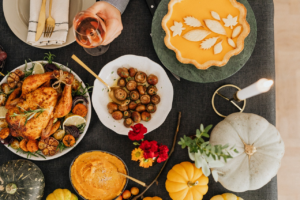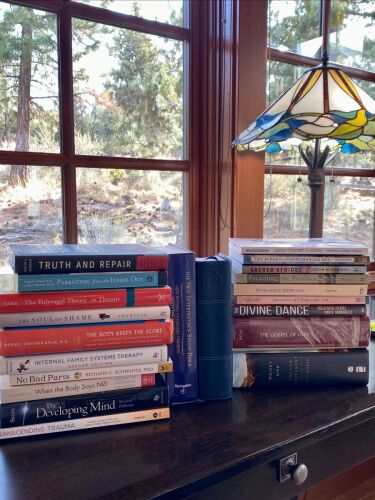
Are you feeling ambivalent about gratitude? About participating in the conversations around the table next week where you share the blessings of the past year?
I’ve already seen quite a few posts as we head toward Thanksgiving, extolling the healing power of gratitude. It’s true that gratitude, properly practiced, has a positive impact on well-being.
The tricky thing is that you can use gratitude to bypass painful emotions.
This Thanksgiving could be your first gathering without a loved one who died. Or, the first time you are going to more than one household because your parents divorced. Perhaps you are more aware of the historical context of the original Thanksgiving, and you are wondering how to honor it. Maybe you’ve never cooked a turkey, and you’re terrified because, for some reason, you said you’d do it this year!
If you’re struggling to find gratitude amid other emotions, pause.
Shift your attention inside. Notice what you are holding in your body. You might not have words for it right away. Emotions live as sensations in your body. Bring your focus to any areas of tension (chest, gut, or neck are likely spots). Hang out with it, just as it is, without needing it to change. It might intensify, or it might ease.
Being present with this part of you will bring clarity about what it’s holding. If it’s a painful emotion, other parts of you might try to shut it down by distracting you or saying it’s no big deal, so you shouldn’t pay attention. Reassure them that you can handle it.
Are you sure I can handle that emotion?
Doubt might arise. Really? Are you sure I can handle my grief? Grief is one of the most painful emotions, and parts of you are afraid that you will be overwhelmed by it if you turn toward it. Our culture minimizes loss, so almost everyone has a protector who works to suppress grief in their inner family. They are the ones who doubt your ability to be present with the vulnerable parts of you holding sadness. Ask them to trust you, to trust that connecting with the vulnerable ones reassures them. Then, when you connect with them, they won’t overwhelm you to get your attention.
Maybe, rather than gratitude, you’re dreading being at the same table with that relative. Making the effort to travel or get your house ready or cook a bunch of things feels exhausting. All of that effort so you can cringe while they share views you find, well, cringe-worthy. Nope. Gratitude is not welling up when you anticipate that scenario.
These members of your inner family also need your attention. Their feelings are valid. I suspect you feel some guilt – that there’s a voice saying you shouldn’t feel that way about your family. Let that part of you know a secret: validating your feelings does not mean they reflect your highest and best self. They are, however, there for a reason. Acknowledging them tends to allow them to pass. Dismissing them out of guilt can backfire because they will intensify.
When you take the time to be with the emotions you’re feeling, just as they are, they will calm, making space for gratitude.
I view gratitude as an intrinsic resource – something you possess as a person who bears God’s image. Rather than working hard to practice feeling grateful, when you connect with the parts carrying your authentic emotions, they can release them. They will know that you received their message.
Connecting with emotions rather than bypassing them creates space for spontaneous gratitude. And Thanksgiving will be a lot more fun.




Leave A Comment